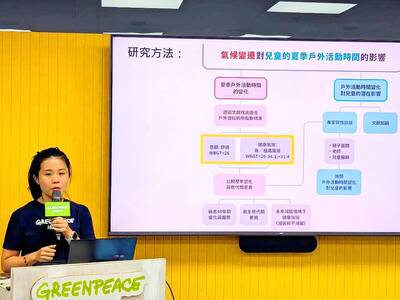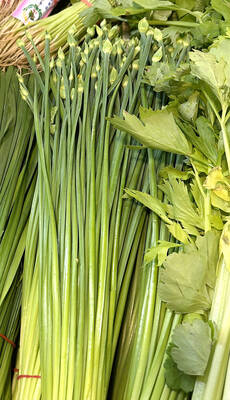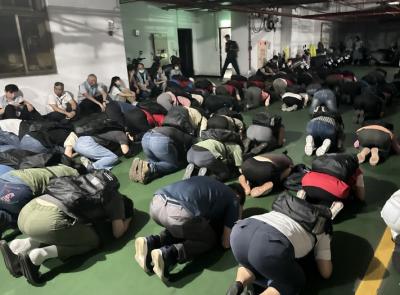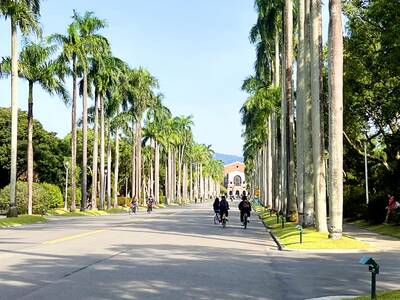A study by the Taiwan Epidemiology Association suggests that people who have slender thighs and large waistlines are at high risk of developing chronic illnesses such as diabetes, cancer and liver diseases.
While some women might desire slim thighs, its study showed that people with a thigh measurement of less than 50cm and a waist measurement of 90cm or more — representing a waist to thigh ratio of at least 1.8 — are twice as likely to develop diabetes, liver disease, cancer and other chronic diseases, the association said.
Hsu Kuang-hung (許光宏), an executive council member of the association, said researchers used a 3D whole body imaging system to scan the physiques of 82 people and analyzed the association between their measurements and their prevalence of developing chronic diseases.
The association’s survey of more than 10,000 people in the past decade had already suggested that having a small thigh measurement may not be a sign of health, as skinny thighs are often linked to a lack of the protein adiponectin, which can increase the risks of diabetes or metabolic syndrome, Hsu said.
People with larger waistlines often have excess visceral fat, which disrupts the normal functioning of the endocrine system, leading to a higher incidence of several diseases, he said.
However, people with adequate fat and muscles in their thighs and legs might have higher levels of anti-inflammatory hormones, he said.
A 49-year-old taxi driver with a waist measurement of 101.6cm and a thigh measurement of 49cm — a waist to thigh ratio of 2.07 — was at first diagnosed with diabetes and hypertension, but was later found to have chronic liver disease as well, he said.
Association executive council member Chiou Hung-yi (邱弘毅) said chronic diseases killed at least 110,000 people in Taiwan last year, and about 19.7 percent of adults are suffering from metabolic syndrome, meaning that almost one in every five people is at a high risk of developing chronic diseases.
Instead of encouraging beauty pageant participants to have slender thighs, they should be encouraged to train their leg muscles by doing regular exercise, such as jogging or walking, Hsu said.

The government should improve children’s outdoor spaces and accelerate carbon reduction programs, as the risk of heat-related injury due to high summer temperatures rises each year, Greenpeace told a news conference yesterday. Greenpeace examined summer temperatures in Taipei, New Taipei City, Taoyuan, Hsinchu City, Taichung, Tainan and Kaohsiung to determine the effects of high temperatures and climate change on children’s outdoor activities, citing data garnered by China Medical University, which defines a wet-bulb globe temperature (WBGT) of 29°C or higher as posing the risk of heat-related injury. According to the Central Weather Administration, WBGT, commonly referred to as the heat index, estimates

The Taipei Department of Health’s latest inspection of fresh fruit and vegetables sold in local markets revealed a 25 percent failure rate, with most contraventions involving excessive pesticide residues, while two durians were also found to contain heavy metal cadmium at levels exceeding safety limits. Health Food and Drug Division Director Lin Kuan-chen (林冠蓁) yesterday said the agency routinely conducts inspections of fresh produce sold at traditional markets, supermarkets, hypermarkets, retail outlets and restaurants, testing for pesticide residues and other harmful substances. In its most recent inspection, conducted in May, the department randomly collected 52 samples from various locations, with testing showing

Taipei and other northern cities are to host air-raid drills from 1:30pm to 2pm tomorrow as part of urban resilience drills held alongside the Han Kuang exercises, Taiwan’s largest annual military exercises. Taipei, New Taipei City, Keelung, Taoyuan, Yilan County, Hsinchu City and Hsinchu County are to hold the annual Wanan air defense exercise tomorrow, following similar drills held in central and southern Taiwan yesterday and today respectively. The Taipei Mass Rapid Transit (MRT) and Maokong Gondola are to run as usual, although stations and passenger parking lots would have an “entry only, no exit” policy once air raid sirens sound, Taipei

Taipei placed 14th in the Quacquarelli Symonds (QS) Best Student Cities 2026 list, its highest ever, according to results released yesterday. With an overall score of 89.1, the city climbed 12 places from the previous year, surpassing its previous best ranking of 17th in 2019. Taipei is “one of Asia’s leading higher-education hubs,” with strong employer activity scores and students “enjoying their experience of the city and often keen to stay after graduation,” a QS staff writer said. In addition to Taipei, Hsinchu (71st), Tainan (92nd), Taichung (113th) and Taoyuan (130th) also made QS’ list of the top 150 student cities. Hsinchu showed the